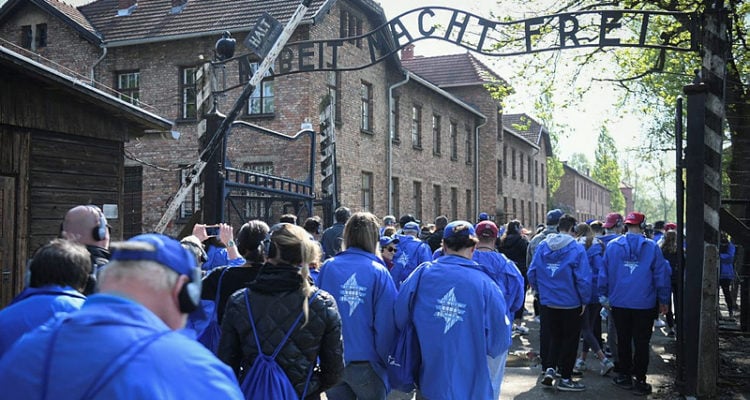The Oct. 7th massacre hit Holocaust survivors especially hard since they had witnessed the state emerge as a haven after the Nazi genocide.
By The Algemeiner and Reuters
Israel’s Holocaust commemorations this year have a searing significance for six elderly survivors now deeply scarred by the Hamas attacks of Oct. 7 that sparked the ongoing Gaza war.
The killing and kidnapping spree by Palestinian terrorists on a Jewish holiday morning shook the sense of security of Israelis – not least, those who had witnessed the state emerge as a safe haven after the Nazi genocide.
For Bellha Haim, 86, the upheaval is especially profound.
Her grandson Yotam – like her, a resident of a village near the Gaza border – was taken hostage by Hamas and managed to escape, only to be accidentally shot dead by Israeli soldiers.
The trauma drove Haim to return to her native Poland, which she had fled with her family as a child during World War Two, and where she will on Monday take part in the “March of the Living” at the site of the Auschwitz death camp.
The annual ceremony is timed to coincide with Israel’s Holocaust memorial day.
“I never went back, and I wasn’t convinced to go back,” she said during a meeting with other survivors ahead of the trip.
“But this time, when they told me that they were connecting the Holocaust and what I call the ‘Holocaust of October 7′ – because then in the Holocaust we (Jews) were not a united people, we didn’t have a country, and suddenly this pride of mine that has been broken, my pride in my people and my country that was shattered in front of my eyes – I said, ‘This time I will break my oath and I will go out.’”
As a teenager, Yotam had taken part in the annual Auschwitz vigil and Haim said she saw the event as a chance for communion with him and other victims of the Hamas attack.
“I will go out in the name of Yotam, who marched there when he was in high school, and I will go out there to shout out the cry of the slain, of the babies, of all my good friends that I will never meet again,” she said.
Arabic yelling and gunfire
Among those joining her will be 90-year-old Daniel Louz, whose hometown Kibbutz Beeri lost a tenth of its residents to the Palestinian attackers.
In some ways, he said, that ordeal was worse for him than the European war, when he escaped Nazi round-ups in his native France although half his family perished in Poland.
After he awoke to the sound of Arabic yelling and gunfire, “I was constantly busy with surviving and figuring out what to do,” Louz said.
“In France, as a child, I suffered all kinds of post-traumas that I’ve learned to cope with. But in Beeri, it was the first time that I felt the fear of death.”
A neighboring house was riddled with bullets. Louz’s was untouched. He says he imagined the souls of the six million Holocaust victims steering Hamas away from him.
“They probably wanted me to be here to tell this story,” he said, weeping.
Other Holocaust survivors participating in the March of the Living include Smil Bercu Sacagiu, 87, whose home was hit by a rocket from Gaza, and Jacqueline Gliksman, 81, whose home was torched by a Palestinian infiltrator.
“What was left, and luckily the terrorist didn’t see it, is my grandchildren,” she said, referring to gold figurines on a necklace she was wearing. “That’s the only thing I have left.”
Before he was seized, Haim’s grandson left a text message: “They’re burning down my house. I smell gas. I’m scared.”
She said that reminded her of a Holocaust-era song in Yiddish, invoking centuries of pogroms, with the refrain “fire, Jews, fire”.
A veteran campaigner for peace with the Palestinians, Haim said she would no longer pursue that activism.
“I’m not able to,” she said. “Now what interests me is only my people.”





